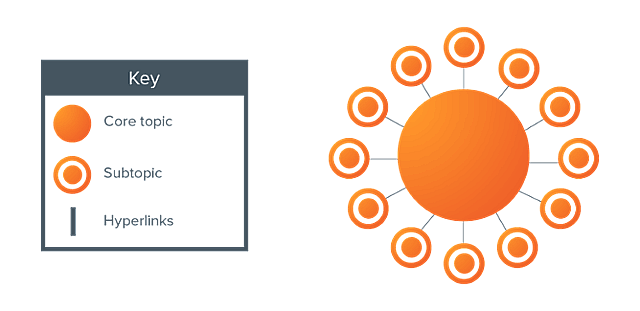What are topics, topic clusters and pillar pages in SEO?
14.10.2019
An introduction to pillar pages, topics, and topic clusters in SEO.
Over recent years, search engine optimisation (SEO) has changed dramatically, shifting from keywords to topics. This is largely down to the evolving nature of search queries and the way people ‘ask’ search engines for answers.
Pillar pages, topics and topic clusters have become vital components of a successful inbound marketing strategy and have changed the way marketers approach SEO.
People once used keywords to rank for the terms that they wanted their business to be associated with. Now, topics have replaced this thinking.
The reason relying on a keyword strategy is outdated is largely due to search engine algorithms being able to understand how ideas relate.
They use latent semantic indexing and weigh site expertise, authoritativeness, and trustworthiness (EAT) to serve the most relevant results. Years ago users would search Google for specific keywords like, “holidays in India”. Now, they’re more conversational. The same search today may look something like this: “where are the best places to visit in India?”. With this change in user behaviour, search engine algorithms had to adapt and learn how content related to queries, as opposed to using exact keywords. This ultimately gave birth to the topic strategy for search engine optimisation.
Definitions of pillar pages topics and topic clusters.
Topics are the things you want your business to be known for. In other words, what you want to appear in search engines for when someone enters a related query.
Topic clusters are the interlinked ‘subtopics’ or ‘cluster content’ related to the core topic. They help boost your site’s relevance to the core topic when someone enters a related query in a search engine.
Pillar pages cover all content relating to a topic on one page. They contain detailed topic cluster content; blog posts, webinars, white papers, podcasts, videos etc to help search engines discover your content and rank its relevance and authority.
Hyperlinks are the links from one webpage to another, that can be activated by clicking on a highlighted word or image. Hyperlinks are the gel that glues all of your related content together so search engines can crawl, index and rank your site.

So, a core topic is what you want your business to be known for and a pillar page houses all of the relevant ‘subtopic’ content related to the core topic to help search engines discover, read and rank your site.
Introducing a pillar page for the thing you want your business to be known for (the topic) and housing all of the relevant content related to that topic (the topic cluster/subtopic content) within that page is the best way to boost your site’s search ranking over time. Doing so results in more leads finding your site and engaging with its content.
Your content strategy should be focused on a small number of core topics that you want to be known for. By creating content based on the search queries related to your core topic in ‘cluster’ blog posts, you will help Google crawl your website (discover it’s content) and rank its authority.
Improve your SEO ranking.
Imagine you work for a small business finance firm and you want to become the go-to experts in your area. ‘Small business finance’ becomes one of your core topics. You then build related subtopic content to form the topic cluster. The easiest way to do this is to think about the most frequently asked questions people ask Google when looking for answers related to your topic. In this case, some example subtopics could be: “How do you raise capital for startups?”, “How do you create a self-employed benefits package?”, “Should you finance your business equipment?”.
If you consistently publish high-quality, relevant content for your audience, search engines will push you up their rankings so that more searchers can find your content.
Want to find out more? Here’s a video from our partners at Hubspot. If you have a spare 20 minutes and want to delve further into this topic, pour yourself a cuppa, sit back and enjoy.

